Mayowa Onare writes his name on the white board in his classroom. Despite Onare’s full name, he goes by Abraham.
Say my name
Nigerian instructor’s life, journey embracing his culture
April 8, 2021
Ota Ibayomi Sugbon Oluwa Mayowa Abraham Onare.
These seven words are not the mere jumbling of letters that many perceive them as. They represent a culture. They’re an identity. They’re a name. While to his close acquaintances he’s referred to as Mayowa, he would soon be known by a new title once he walked onto the TISD campus for the first time: Abraham.
“I just used Abraham as my workplace name. On my social media, I still use my original name, Mayowa. If you looked up Abraham Onare, you probably won’t find much information,” said Abraham Onare, who teaches computer science and video game design. “Most of the things I do [outside of work], my information is listed under Mayowa Onare. I understand the cultural heritage attached names, so I use my Nigerian name everywhere else.”
Moving from Nigeria to America in 2014, Onare wasted no time finding a stable occupation. While Onare had plans to flourish in Dallas, fate changed his initial course. As he was driving through an unfamiliar city — Texarkana — Onare stopped at the Exxon gas station on Summerhill Road to fill up his tank prior to his upcoming drive to Dallas. However, this stop to refuel soon led to the unfolding of his future career.
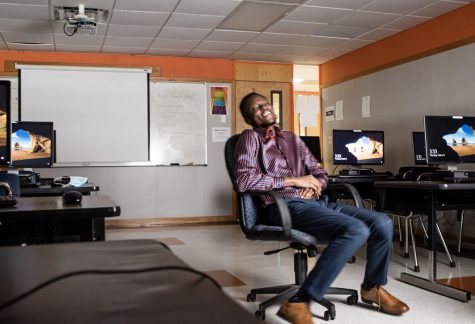
“I drove down the road and I saw this school district. My curiosity got to me, so I walked into the Admin Office. I asked them, ‘Do you have a job?’ And they replied, ‘What do you have?’ I told them [my degrees], and they said that I could apply to be a long-term substitute,” Onare said. “I was sent to Mr. [Brad] Bailey the following day where he asked me when I wanted to start, and everything just went from there.”
Onare’s years of educational experience and successes show why he’s now a full-time computer science instructor rather than a substitute. Even after a long day at work, he points his attention toward completing his PhD in International Development. However, this work-in-progress is only a small fraction of Onares’ college degrees.
When it comes to [work ethic] in Nigeria, people stay motivated. In an economy where you’re fighting to compete with others, in Nigeria, a bachelor’s degree is not a big deal.
— Mayowa Onare
“I might have too many,” Onare said. “I have a bachelor’s in mathematics, [and] master’s in computer science, theology, business, economic development and entrepreneurship. I started with a PhD in computer science. I was passing, but I wasn’t really liking it. I went back to do another master’s in economic development, so I could do my PhD in an economic-related field. Where does my career go from here? I want to do something that has to do with economic developments, international developments, international security, global economics or just something within economics.”
Back home in Nigeria, Onare worked to accomplish yet another one of his life’s goals: to become an author. When he’s not preoccupied with school work, he can be found typing out his ideas in the form of a novel.
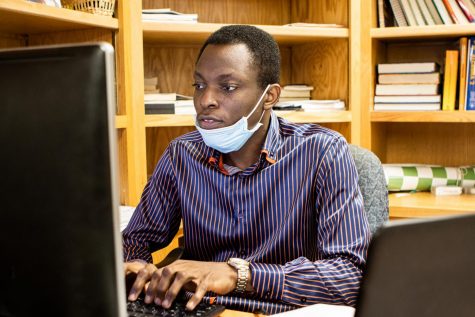
“It’s actually a Christian book discussing that sometimes you can go through a lot in life and lose your track,” Onare said. “It’s possible for you to meet someone without actually knowing them. There’s a difference from the real [version of someone] compared to the version that has been shaped by circumstances, disappointments and bad memories. I wrote the book ‘Get Back into Your Wealthy Place’ for people who have been displaced from where they originally were supposed to be. There was a time I went to Mrs. [Michele] Rigdon for some editing over the book, but being a teacher has kept me so busy.”
While Onare values having the opportunity to strengthen his curriculum and gain new experiences, his own culture, along with his family, is over 6,000 miles away in Nigeria. Ever since he embarked to the U.S., he has been unable to see any relatives in person.
“I haven’t been back to Nigeria in seven years. I miss my family, but I talk with them everyday on WhatsApp,” Onare said. “We’ll have family group chats, so we can keep up with everybody and everything going on.”
Even though he misses his family, Onare cannot just hop on a plane to go visit. Due to complications with visas, exiting the country is far from easy.
“In 2019, my mother died, and I wanted to go to the funeral. However, the immigration process is kind of different. I applied for my passport, but I didn’t get it on time. There’s just too many logistics attached to it,” Onare said. “I’m on an H1B visa, which is a special worker-type of visa. There are restrictions to each type. But at that time, my passport was expiring, and I had to renew the passport before I could travel, and the renewal took too long.”
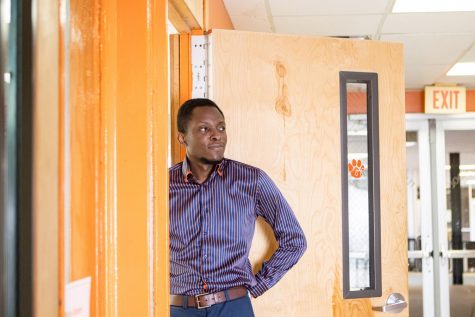
Throughout the years Onare has spent in America, the cultural differences continue to be evident. He imagined skyscrapers to be towering through clouds in each city, and he failed to wrap his mind around the fact that a new chicken fast food chain sat on each street corner.
“I grew up in the middle class. My dad was an engineer and my mom worked for the government. Parental control in Nigeria is different from [the U.S.], so we have a lot of restrictions and a lot of spanking,” Onare said. “Pretty much, even in high school, you get whooped or spanked by your teacher, whichever one you choose. So let’s say for instance, you’re given a test, and you make a bad grade on the test, [you can get a spanking].”
While Onare holds nothing against the mannerisms of the individuals he’s interacted with in Texas, it didn’t take him long to realize how much more sociable and personified the citizens in Nigeria are.
“The average Nigerian is very friendly. In Nigeria, we meet colleagues, we exchange phone numbers, ask about the meaning of each other’s name — it’s just natural, there’s nothing attached,” Onare said. “When I got to the U.S., the first thing I discovered is you can’t just walk up to someone and say, ‘Hey, how are you doing? What’s your name? What’s your number?’ For example, it was my first week in the U.S. and I saw a lady on campus with African braids that looked really nice. I said, ‘Those braids look so good on you.’ I asked for her number, and she said ‘I have a boyfriend,’ but in Nigeria, that would’ve just been a normal interaction.”
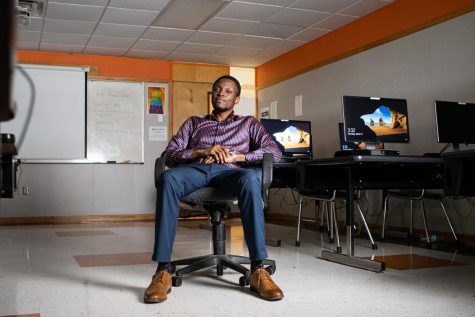
As Onare continues his career at TISD, some people still raise the question as to why he doesn’t bring attention to the fact that his birth name Mayowa — the name that represents his Nigerian culture and means “The devil planned to mock me, but God brought me joy” — is not represented on his work name badge.
“I have a student in my class, and I’ve been trying to pronounce his name since the beginning of the school year. Sometimes I want to call on him, but I’m so cautious. In my head I’m like, ‘I hope I’m not going to mess up his name.’ I understand when people have that feeling. But Abraham, nobody can mess up the name Abraham,” Onare said. “I know keeping my Nigerian name could bring more diversity to our school’s culture because anybody can just go online and see ‘Abraham Onare,’ but they won’t be able to gauge where I’m from. The truth is, it doesn’t bother me. You can call me Abraham, you can call me Mayowa, in the end, there’s no difference.”

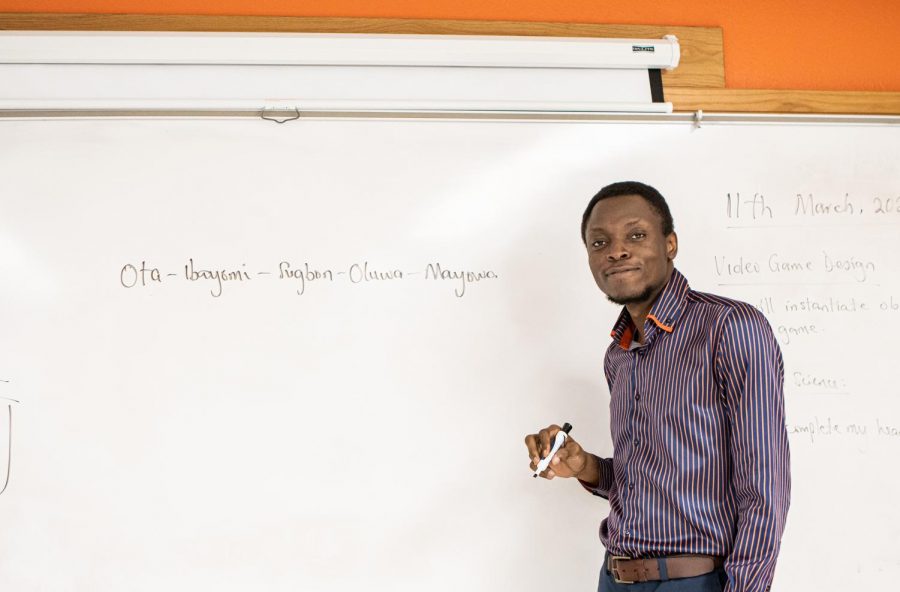
Rebecca Frix • Apr 9, 2021 at 7:57 pm
Awesome Story! Love the way he ended up in Texarkana and wow all the degrees. The students are lucky to have him as a teacher
Hollie sims • Apr 8, 2021 at 6:21 pm
We are so lucky to have such a well educated and kind teacher on campus! Thank you for all that you do.